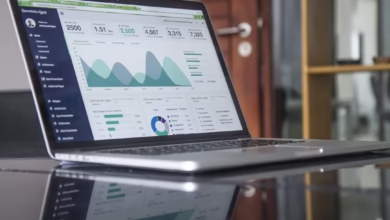Optimizing Supply Chain Efficiency: A Comprehensive Guide to Key Reports and Evaluation Techniques

In today’s fast-paced and interconnected world, supply chain reports have emerged as vital tools for businesses aiming to enhance logistics and efficiency. These reports provide a comprehensive overview of key metrics that allow organizations to evaluate their supply chain performance, identify areas for improvement, and make informed decisions. By utilizing various types of reports—including financial reports, market research, and sustainability reports—companies can gain valuable insights into their operations and refine their strategies to boost overall business performance.
As the landscape of supply chain management evolves, understanding the intricacies of supply chain reports becomes essential. This article will explore key topics such as the evaluation techniques employed in supply chain reports, the critical role of market and financial reports in driving efficiency, and how leveraging sustainability and risk assessment reports can lead to improved business outcomes. Join us as we delve into the latest report trends and analysis, equipping you with the knowledge to navigate the complexities of supply chain management effectively.
- 1. Understanding Supply Chain Reports: Key Metrics and Evaluation Techniques
- 2. The Role of Market Research and Financial Reports in Enhancing Supply Chain Efficiency
- 3. Leveraging Sustainability and Risk Assessment Reports for Improved Business Performance in Supply Chains
1. Understanding Supply Chain Reports: Key Metrics and Evaluation Techniques
Understanding supply chain reports is essential for businesses aiming to enhance logistics and efficiency. These reports provide a comprehensive overview of various metrics that evaluate the performance of supply chains. Key metrics include lead time, order accuracy, inventory turnover, and transportation costs. By analyzing these metrics, organizations can identify inefficiencies and areas for improvement.
One effective way to evaluate supply chain performance is through financial reports, which detail the economic impact of logistics operations. These reports often include cost analyses related to transportation and warehousing, enabling businesses to assess their overall profitability. Additionally, market research and industry reports can provide insights into competitive positioning and market trends, allowing companies to adjust their strategies accordingly.
Sustainability reports are increasingly important as businesses seek to minimize their environmental impact. These reports evaluate the sustainability of logistics practices and highlight opportunities for reducing carbon footprints, which is an essential consideration in today’s eco-conscious marketplace. Furthermore, risk assessment reports are critical for identifying potential disruptions within supply chains, whether due to geopolitical issues or natural disasters.
To facilitate better decision-making, companies often rely on a variety of report templates tailored for specific needs, such as sales reports or project reports. These templates streamline the reporting process and ensure consistency across various departments. Regular progress reports help track the implementation of supply chain strategies, while audit reports assess compliance with industry standards.
In summary, the effective utilization of supply chain reports—ranging from financial reports to customer feedback reports—enables businesses to enhance logistics efficiency, drive better business performance, and remain competitive in their respective industries. By staying informed on report trends and leveraging comprehensive report analysis, organizations can achieve a more agile and responsive supply chain.
2. The Role of Market Research and Financial Reports in Enhancing Supply Chain Efficiency
Market research and financial reports play a crucial role in enhancing supply chain efficiency by providing valuable insights that drive decision-making and strategic planning. These reports not only help organizations understand their current standing but also allow them to identify areas for improvement within their supply chain processes.
Market research serves as a foundation for understanding consumer behavior, market trends, and competitor strategies. By analyzing industry reports and conducting competitor analysis, businesses can gain insights into how their supply chains measure up against industry standards. This information can inform adjustments in logistics and operational processes, ultimately leading to improved efficiency.
Financial reports, such as annual reports and business performance reports, provide a comprehensive view of an organization's financial health. These reports highlight key metrics, including revenue streams and cost management, which are essential for evaluating the effectiveness of supply chain investments. For example, by analyzing sales reports and profitability metrics, companies can assess whether their supply chain strategies are yielding the desired financial outcomes.
Additionally, sustainability reports and environmental reports can guide organizations in adopting greener practices within their supply chains, which not only enhances efficiency but also meets the growing demand for corporate responsibility. By integrating sustainability metrics into financial assessments, companies can refine their supply chain strategies to reduce waste and optimize resource use.
Furthermore, risk assessment reports and audit reports play an essential role in identifying potential vulnerabilities within the supply chain. By regularly reviewing project reports and progress reports, organizations can proactively address issues that may disrupt the flow of goods and services. This risk management ensures that the supply chain operates smoothly and efficiently, even in the face of unforeseen challenges.
In conclusion, leveraging market research and financial reports is vital for organizations seeking to enhance their supply chain efficiency. By utilizing these reports effectively, businesses can make data-driven decisions that not only improve operational performance but also contribute to long-term sustainability and competitiveness in the market.
3. Leveraging Sustainability and Risk Assessment Reports for Improved Business Performance in Supply Chains
In today's competitive landscape, leveraging sustainability and risk assessment reports can significantly enhance business performance within supply chains. Companies are increasingly recognizing that integrating these reports into their operational strategies not only improves efficiency but also aligns with consumer expectations and regulatory requirements.
Sustainability reports, which detail a company's environmental impact and initiatives, can provide insight into long-term operational efficiencies and cost savings. By analyzing these reports, businesses can identify areas where energy consumption can be reduced, waste can be minimized, and resources can be optimized. This not only contributes to a healthier planet but can also lead to improved economic reports reflecting decreased operational costs and enhanced profitability.
Risk assessment reports play a critical role in understanding potential vulnerabilities within the supply chain. By conducting thorough risk evaluations, organizations can proactively identify and mitigate risks associated with suppliers, logistics, and market fluctuations. This proactive approach allows for better decision-making, which is essential for maintaining robust supply chain operations. For instance, insights from risk assessment can lead to the development of contingency plans that ensure business continuity and resilience, ultimately reflected in more favorable investor reports and financial reports.
Moreover, integrating findings from sustainability and risk assessment reports into project reports and progress reports creates a comprehensive view of the supply chain's health. This holistic approach facilitates strategic planning and informed adjustments, enhancing overall business performance. Regularly updated report templates and report analysis tools can streamline this process, ensuring that decision-makers have access to the latest data on supply chain efficiency and sustainability efforts.
Additionally, aligning sustainability goals with risk management not only complies with governmental regulations outlined in environmental reports but also positions the company as a leader in corporate responsibility. This alignment can enhance brand reputation, improve customer feedback reports, and lead to increased market share.
In summary, by leveraging sustainability and risk assessment reports, businesses can enhance their supply chain efficiency, improve financial performance, and build a resilient framework that supports long-term growth. This strategic integration is essential for adapting to evolving market conditions and meeting stakeholder expectations effectively.
In conclusion, supply chain reports serve as vital tools for evaluating logistics and efficiency within supply chains. By understanding key metrics and employing effective evaluation techniques, businesses can enhance their operational performance. The integration of market research and financial reports is essential in identifying areas for improvement and fostering better decision-making. Additionally, leveraging sustainability and risk assessment reports not only contributes to overall business performance but also aligns organizations with growing environmental and social responsibilities.
As we navigate an increasingly complex economic landscape, staying informed through comprehensive industry reports, annual reports, and other relevant documentation will be crucial. These reports provide valuable insights into market trends, competitor analysis, and customer feedback, enabling organizations to adapt and thrive. By utilizing report templates and focusing on report analysis, businesses can streamline their processes and enhance their strategic planning.
Ultimately, the continuous evaluation and integration of various reports—including sales reports, marketing reports, audit reports, and progress reports—will empower supply chain stakeholders to make informed decisions. This proactive approach will not only improve efficiency but also drive sustainable growth in today’s competitive marketplace. Embracing the insights from these reports will lay the foundation for a resilient and effective supply chain strategy that meets the demands of the future.





